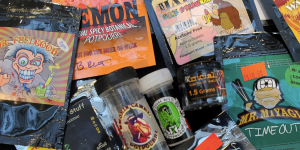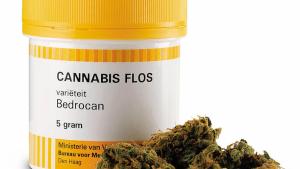The nation's most populous state is likely to legalize weed in November. Then what?
The Indiana governor's views on drug policy are mostly old-style and hard line.
Some senators take a tiny first step on medical marijuana, a California pot-growing county approves a massive medical marijuana farm, Montanans will have the chance to reinstate their medical marijuana system in November, and more.
The border remains a temptation for Texas cops, a Southern California dispensary was a temptation for a crew of misbehaving cops there, and more.
Governors use their bill-signing pens in Rhode Island and North Carolina, a new poll has surprisingly strong support for marijuana legalization in Wisconsin, Montanans will vote on medical marijuana in November, and more.
A new report finds legal marijuana has been good for Colorado's economy, the White House announces President Obama will sign CARA, and more.
Officials in California's Humboldt County have approved a massive, seven-acre medical marijuana grow operation, Missouri's governor signs a bill allowing pot offenders to get their records expunged, New York's governor announces a crackdown on "synthetic marijuana," and more.
Voters in Arizona can now read arguments for and against the marijuana legalization initiative, legalization opponents don't want to let them have a chance to vote on it, "bath salts" will be banned in Illinois, and more.
A Massachusetts poll has the legalization initiative losing, a New Hampshire poll shows record support for legalization, Florida's first dispensary gets the okay to open, Illinois protects drug court participants' opioid treatment access, and more.
There's a job opening for an experienced marijuana activist in DC, Libertarian Gary Johnson endorses California's legalization initiative, three European countries are making marijuana policy moves, and more.
It's one of those all-weed news days, with Republicans reaching the tipping point on marijuana legalization, Canadian provincial leaders demanding quick action on legalization, and more.
This article was produced in collaboration with AlterNet and first appeared here.
Twenty years ago, California led the way on weed, becoming the first state in the nation to approve medical marijuana. Now, while it's already lost the chance to be the first to legalize recreational use, the Golden State is poised to push legal pot past the tipping point.
Although voters in Colorado and Washington first broke through the grass ceiling in 2012, with Alaska, Oregon, and Washington, DC, following suit in 2014, if and when Californians vote to legalize it this coming November, they will more than triple the size of the country's legal marijuana market in one fell swoop.
It's not a done deal until election day, of course, but the prospects are very good. The Adult Use of Marijuana Act (AUMA) legalization initiative is officially on the ballot as Proposition 64, it has cash in the bank for the campaign (more than $8 million collected so far), it has broad political support, including Lt. Gov. Gavin Newsom (D) and at least four California US representatives, and it has popular support, with the latest poll showing a healthy 60% of likely voters favor freeing the weed.
It's also that the surfer's paradise is riding a weed wave of its own creation. Thanks in large part to the "normalization" of the pot business that emerged out of California's wild and wooly medical marijuana scene, the national mood about marijuana has shifted in recent years. Because of California, people could actually see marijuana come out of the shadows, with pot shops (dispensaries) selling it openly to anyone with an easily obtained doctor's recommendation and growers turning parts of the state in pot cultivation hotbeds. And the sky didn't fall.
At the same time, the shift in public opinion has been dramatic. According to annual Gallup polls, only a quarter of Americans supported marijuana legalization when California voted for medical marijuana in 1996, with that number gradually, but steadily, increasing to 44% in 2009, before spiking upward ever since then to sit at 58% now.
California isn't the only state riding the wave this year -- legalization will also be on the ballot in Maine and Nevada and almost certainly in Arizona and Massachusetts -- but it is by far the biggest and it will help the state regain its reputation as cutting edge on social trends, while also sending a strong signal to the rest of the country, including the federal government in Washington.
But what kind of signal will it send? What will legalization look like in the Golden State? To begin, let's look at what Prop 64 does:
- Legalizes the possession of up to an ounce of marijuana and the cultivation of up to six plants (per household) by adults 21 and over.
- Reduces most criminal penalties for remaining marijuana offenses, such as possession or cultivation over legal limits or unlicensed distribution, from felonies to misdemeanors.
- Regulates the commercial cultivation, processing, distribution, and sale of marijuana through a state-regulated licensing system.
- Bars commercial "mega-grows" (more than ½ acre indoors or 1 acre outdoors) until at least 2023, but makes provisions for licensed "microbusinesses" (grows smaller than 10,000 square feet).
- Allows for the licensing of on-site consumption premises, or "cannabis cafes."
- Allows cities and counties to regulate or even prohibit commercial marijuana activities, but not prohibit personal possession and cultivation.
- Taxes marijuana at 15% at the retail level, with an additional $9.25 per ounce cultivation tax imposed at the wholesale level.
In other words, pot is largely legalized and a taxed and regulated market is established.
Some changes would occur right away, advocates said.
"The criminal justice impact will be huge and immediate, and it will start on November 9," said Lynne Lyman, California state director for the Drug Policy Alliance (DPA), which is backing Prop 64 not only rhetorically, but also with its checkbook through its lobbying and campaign arm, Drug Policy Action.
California arrests about 20,000 people a year for marijuana felonies and misdemeanors, currently has about 10,000 people incarcerated for pot offenses, and has as many as half a million people with pot convictions on their records. Things are going to change in a big way for all these people.
"Those marijuana arrests will stop," said Lyman. "And everyone currently sitting in jail or prison will be eligible to apply for release. They will have to file a petition, but like Prop 47 [the sentencing reform initiative passed in 2014], unless there is a compelling reason to deny it, the court must grant it. Similarly, all those people who have had marijuana offenses will be eligible to have their record reclassified."
To be clear, it will still be possible to be arrested for a marijuana offense in California after Prop 64. Possession of more than an ounce (or more than four grams of concentrate) will be a crime punishable by up to six months in jail and possession of less than an ounce can be a misdemeanor offense if it is on school grounds during school hours.
Similarly, cultivation of more than six plants without being a permitted medical marijuana patient or without a license is still a crime, but typically only a misdemeanor punishable by a maximum of six months in jail. There are some exceptions: Illegal growers could be charged with a felony if the person has prior violent offenses or violates state water or environmental laws.
Minors get special treatment. Kids under 18 who get caught with pot are hit with an infraction punishable by drug education, counseling, or community service, but no fines. People between 18 and 21 get an infraction with a maximum $100 fine. And while adults who possess pot on a school grounds during school hours get a misdemeanor, kids under 18 will only be hit with an infraction.
"We want to reduce the number of young people getting into the system, and this will really dial down the firehose into mass incarceration," said Lyman.
The state's largest marijuana consumer group, California NORML, certainly likes those provisions, but it only gives Prop 64 one thumb up and foresees some issues down the road.
"We're supporting the
AUMA with reservations," said the group's long-time head Dale
Gieringer. "It's not the best initiative ever written -- it has some problems that will have to be addressed -- but it is an important step. The huge thing it does is legalize adult possession of an ounce and adult cultivation of up to six plants. That's big. And it turns cultivation and possession with intent felonies into misdemeanors, or at worst, wobblers," meaning prosecutors could only in limited cases charge them as felonies.
"The AUMA is very long and complicated, with unnecessary hang-ups and restrictions," Gieringer complained, citing bans on public smoking and vaping as examples.
"In places where there are bans on smoking in apartments or residences, in public is about the only place you can smoke. If it's illegal to smoke pot in a public place, people will be hard-pressed to find any place," he said. "You can't even vaporize in a public place, and that's totally out of line with the existing science. They just caved in to the powerful anti-smoking lobby on that, and we can't endorse that."
The CaNORML membership also includes pot farmers, of which the group estimates there are some 30,000 in the state. They are nervous, Gieringer said.
"We have a lot of small growers and they have a lot of issues," he explained. "They are concerned about regulatory provisions they fear could quickly push small growers out of the business. AUMA requires you to be an in-state resident, and we're already growing more than we need, yet we have out-of-state sponsors lining up behind in-state sponsors."
Indeed, earlier this month, the state industry's largest membership group, the California Growers Association, voted to remain neutral on Prop 64 -- or least for now -- after its membership split almost down the middle on whether to support it. Growers, including association head Hezekiah Allen, worried that big-money investment and consolidation of the industry impelled by huge "mega-grows" could wipe out the now generations-old traditional pot farming scene in the stat's North Coast.
Allen warned in a report to the group's board that such consolidation could "result in a catastrophic economic collapse for huge swathes of California," including the North Coast's Emerald Triangle.
Stoners may have to fight for the right to toke and pot farmers for their place in the market, but some of the communities most buffeted by drug prohibition should see benefits. Prop 64 contains language that will direct revenues to minority communities, and also opens the door for localities themselves to take proactive steps toward racial justice.
"The AUMA has a community reinvestment fund with the first revenues available in 2019," said DPA's Lyman, adding that it will be $10 million the first year and up to $50 million a year in the futre. "This is going to communities most impacted by the drug war, black and brown communities, and will include everything from legal services, to public health and economic development. The communities will be able to decide."
Localities will also be deciding on how to implement regulation of the legal market, and that is another opportunity, Lyman said.
"Hopefully, we will see things like what happened in Oakland, where under the new regulations, 50% of the new licenses have to be from the community," she said. "We hope other cities will do that to mitigate racial discrimination and the injustice of the past by prioritizing people of color and women, so we don't end up white a bunch of white men getting rich off what black and brown people have endured. DPA will be very involved in this."
Somebody is going to be making money, though. The state's marijuana market, estimated at $2.7 billion for medical last year, could quickly hit $7 billion under legalization.
"I see tremendous potential for a blossoming of cannabis opportunities," said veteran California marijuana activist, author, and historian Chris Conrad, who has become a pro-Prop 64 spokesman under the rubric of Friends of Prop 64. "Of course, the size of the industry will be impacted by the need to limit the market to intra-state rather than national or international. Given that California is the world's sixth largest economy and has the largest appetite for cannabis in the world, the state's nonmedical market is going to be sizeable."
Legalization will bring changes from price reductions to changing product lines, he said.
"Overall marijuana production is expected to soar, prices to come down and probably a lot more cannabis will be converted into extracts and expand or open new markets for personal hygiene products, topical remedies and essential oils," Conrad predicted. "There will be large-scale cannabis production that is homogenized with relatively low to medium potency, but still of better quality than Mexican brick weed. But we will never replace the boutique markets any more than Budweiser has eliminated microbreweries or 'Big Wine' has wiped out California's family vintners."
And it's not just marijuana, but pot-related businesses that will boom, said DPA's Lyman.
"Formalizing regulations for the first time will expand the industry, and there will be lots of ancillary industries, such as marketing, packaging, and tracking, that should all thrive in post-legalization California," she said.
"There will be new ancillary markets for products such as locking stash boxes for people to carry their cannabis while driving, toking stations near entertainment venues and discrete, low-wattage, six-plant cultivation tents specialized for use in condos and apartments," added Conrad.
Conrad said he expected counties and cities will opt in to the revenues from allowing pot commerce instead of locking themselves out with bans.
"The distribution around the state will likely be porous, some areas more saturated and others with less access," he said. "Since towns will be licensing lawful businesses and no longer will be at the mercy of the county prosecutors' discretion, I expect to see a general spread of retail sites and onsite consumption shops around the state. Not in every town, not as obnoxious and omnipresent as liquor stores, but not too far away, either."
We shall see.
"You can't predict the future," said Gieringer. "It will be a new situation. Medical marijuana here evolved through several different stages, and I expect the same process to unfold here with the Adult Use of Marijuana Act. On balance, the AUMA is an important step, but it's not the end game, and it leaves us with unresolved problems."
You may not be able to predict the future, said Lyman, but you can influence it.
"This will be a work in progress," she said. "The long-term work of implementation starts on November 8. We have to be there. To continue to be engaged will be critical."
But even under state level legalization in California, as long as there is pot prohibition somewhere in America, there will be Golden State growers ready to supply the market.
"The one thing everyone needs to recognize is that this does not end the problem of illegal marijuana growing in California," said Gieringer. "The industry has been well-entrenched for generations and is currently supplying the rest of the country, too. That market isn't going to disappear. The more expensive and difficult it is to become legal, the more people will likely participate in that black market."
back to top
The Republican nominee's choice of Indiana Gov. Mike Pence as his running mate means Trump has selected a man who is the very embodiment of last century's "tough on drugs" prohibitionist attitudes.

Trump VP pick Mike Pence doesn't have a great record on drug policy. (flickr.com/gage skidmore)
Indiana has tough marijuana laws, with possession of even the smallest amount of pot worth up to six months in county jail and possession of more than 30 grams (slightly more than an ounce) a felony punishable by up to 2 ½ years in prison. Selling any amount more than 30 grams is also a felony, again punishable by up to 2 ½ years in prison.
Mike Pence is just fine with that. In fact, three years ago he successfully blocked a move in the legislature to reduce some of those penalties, saying that while he wanted to cut prison populations, he didn't want to cut penalties to achieve that end.
"I think we need to focus on reducing crime, not reducing penalties," he said. "I think this legislation, as it moves forward, should still seek to continue to send a way strong message to the people of Indiana and particularly to those who would come into our state to deal drugs, that we are tough and we're going to stay tough on narcotics in this state."
Pence did sign emergency legislation allowing for needle exchange programs in some Indiana counties last year, but only after initial resistance, during which more than 150 cases of HIV/AIDS were reported in one county alone. His hesitance was in line with his anti-drug values, as evidenced by his 2009 vote as a US representative to keep intact a federal ban on funding for needle exchanges.
Pence is also a gung-ho drug warrior when it comes to the Mexican border, having voted to support billions in funding for Mexico to fight drug cartels and for using the US military to conduct anti-drug and counter-terror patrols along the border.
Bizarrely enough, there is one drug Pence has no problems with, but it's a legal one: nicotine. That's right, the drug warrior is an apologist and denier for Big Tobacco.
"Time for a quick reality check," he said in 2000. "Despite the hysteria from the political class and the media, smoking doesn't kill."
Pence has been handsomely compensated by tobacco companies for his advocacy against anti-smoking public health campaigns, even though they have proven wildly successful in driving down smoking rates. Pence can be viewed as a man who rejects proven public health interventions for one dangerous substance while insisting on failed punitive, prohibitionist policies for another, less dangerous, substance.
(This article was prepared by StoptheDrugWar.org's lobbying arm, the Drug Reform Coordination Network, which also pays the cost of maintaining this web site. DRCNet Foundation takes no positions on candidates for public office, in compliance with section 501(c)(3) of the Internal Revenue Code, and does not pay for reporting that could be interpreted or misinterpreted as doing so.)
back to top
Some senators take a tiny first step on medical marijuana, a California pot-growing county approves a massive medical marijuana farm, Montanans will have the chance to reinstate their medical marijuana system in November, and more.
NationalLast Friday, a CBD research bill was filed in the Senate. Four members of the Senate Judiciary Committee, Sens. Dianne Feinstein (D-CA), Chuck Grassley (R-IA), Patrick Leahy (D-VT), and Tom Tillis (R-NC), filed the Cannabidiol Research Expansion Act (S. 3269). The bill would require the attorney general to determine whether CBD should be considered a separate substance from marijuana and whether it should be rescheduled or removed from the Controlled Substances Act.
California
Last Friday, Humboldt County approved a massive medical marijuana farm. The Emerald Triangle pot-growing county has approved its first medical marijuana grows under new regulations adopted this year. One is a quarter-acre mixed-light farm in Carlotta and the other is a seven-acre outdoor grow and processing center in Honeydew.
Montana
Last Wednesday, a medical marijuana initiative qualified for the ballot. An initiative aimed at reestablishing the state's medical marijuana system has qualified for the November ballot, state officials said. The I-182 initiative would reverse restrictions imposed by the legislature in 2011 and, after lengthy court challenges, set to go into effect on August 31. Voters had approved the state's medical marijuana system in 2004.
Rhode Island
Last Wednesday, the governor signed a bill allowing medical marijuana for PTSD. Gov. Gina Raimondo (D) signed into law a bill that will allow medical marijuana to be recommended for the treatment of PTSD symptoms.
[For extensive information about the medical marijuana debate, presented in a neutral format, visit MedicalMarijuana.ProCon.org.]
back to top
The border remains a temptation for Texas cops, a Southern California dispensary was a temptation for a crew of misbehaving cops there, and more. Let's get to it:
In Santa Ana, California, three Santa Ana police officers were fired last Thursday for their antics during the raid of a medical marijuana dispensary. Officers disabled surveillance cameras during the raid, but forgot one, leading to the whole thing being caught on video. The video showed police ridiculing a disabled woman in a wheelchair, laughing and joking, throwing darts, and eating snacks from the dispensary, which may or may not have been medical marijuana edibles. Officers Brandon Matthew Sontag, Nicole Lynn Quijas, and Jorge Arroyo are the ones fired. All three are also charged with petty theft, and Sontag is charged with vandalism for breaking the store's surveillance cameras.In McAllen, Texas, a former Mission police officer and DEA task force member was convicted last Thursday of ripping off cocaine, cutting and packaging it, then using some of it in a staged fake drug bust. Hector Mendez, 46, and a coconspirator ripped off more than 30 pounds of cocaine. A jury convicted Mendez of conspiracy to possess with intent to distribute cocaine.
In Del Rio, Texas, a former Del Rio police officer was sentenced last Wednesday to seven years in federal prison after admitted he sold cocaine from an auto body shop he owned. Raymond Villarreal earlier had been found guilty by a jury of conspiracy to possess with intent to distribute cocaine. He also has to do five years of probation.
In Flemington, New Jersey, a former senior Department of Corrections guard was sentenced last Wednesday to five years in state prison for supplying synthetic cannabinoids to inmates at a Clinton Township youth jail. Nickoy Ellis, 32, had earlier pleaded guilty to official misconduct. He is also barred from ever holding public employment in the state.
back to top
Governors use their bill-signing pens in Rhode Island and North Carolina, a new poll has surprisingly strong support for marijuana legalization in Wisconsin, Montanans will vote on medical marijuana in November, and more.

People with PTSD will now be able to use medical marijuana in Rhode Island. (Wikimedia.org)
Wisconsin Poll Has Strong Majority for Marijuana Legalization. A Marquette Law School poll released Wednesday has a whopping 59% support for freeing the weed in the Badger State. The poll question asked whether pot should be "fully legalized and treated like alcohol." The level of support is up dramatically from September 2014, when voters asked a similar (but not identical) question about legalization only gave it 46% support.
Medical Marijuana
Montana Medical Marijuana Initiative Qualifies for the Ballot. An initiative aimed at reestablishing the state's medical marijuana system has qualified for the November ballot, state officials said Wednesday. The I-182 initiative would reverse restrictions imposed by the legislature in 2011 and, after lengthy court challenges, set to go into effect on August 31. Voters had approved the state's medical marijuana system in 2004.
Rhode Island Governor Signs Bill to Allow Medical Marijuana for PTSD. Gov. Gina Raimondo (D) Wednesday signed into law a bill that will allow medical marijuana to be recommended for the treatment of PTSD symptoms.
Heroin and Prescription Opioids
Congress Passes Major Heroin and Opioids Bill, But Doesn't Adequately Fund It. The Senate voted Wednesday to send opioid legislation known as the Comprehensive Addiction and Recovery Act (CARA) to President Obama for his signature. The House voted last week 407-5 to approve CARA. The bill advances a large number of treatment and prevention measures intended to reduce prescription opioid and heroin misuse, including evidence-based interventions for the treatment of opioid and heroin addiction and prevention of overdose deaths. This bill, however, does not provide federal funding. Republican leadership have maintained that opioid funding must be appropriated through regular order and have repeatedly pledged to fund the programs authorized in CARA this year. Advocates urge Congress to deliver on this promise.
Harm Reduction
North Carolina Governor Signs Bill to Allow Needle Exchanges. Gov. Mike McCrory (R) Monday signed into law House Bill 972, which authorizes the operation of needle exchange programs by local governments.
International
Indian MP Calls for Legalization of Recreational Drugs. MP Dr. Dharamvira Ghandi said Wednesday he is crafting an amendment to the Narcotic Drugs and Psychotropic Substances Act to legalize recreational drugs. Gandhi has been working with Delhi-based lawyers and professionals on a draft of the bill. He says drug prohibition has failed. "Punitive measures to combat the supply of drugs failed miserably, as demand for drugs had exhibited an exponential growth, leading to creation of drug mafias that provided continuous supplies, regardless of the harshest provisions for punishment," he said. "It has dawned upon countries worldwide that by decriminalizing certain substances that pose minimal health risks, and by following harm reduction policies, the demand for harmful and killing medical drugs had dropped drastically, along with the offences committed. Certain Indian states are currently facing a massive drug problem, with citizens between 15-40 years of age abusing drugs, and this has caused considerable harm to society in general, and the youth in particular."
back to top
A new report finds legal marijuana has been good for Colorado's economy, the White House announces President Obama will sign CARA, and more.

The president will sign the Comprehensive Addiction and Recovery Act despite the lack of adequate funding. (whitehouse.gov)
Report Finds Legal Marijuana Bolstering Retail, Manufacturing in Colorado. In a new report, the University of Colorado Leeds School of Business finds that the state's marijuana industry is bumping up retail sales and hiring in manufacturing. Recreational cannabis sales began in 2014. That year, "We had a 3.5% increase in employment. In 2015, a 4.9% increase in food-manufacturing employment," the report said. "The data doesn't allow us to slice and dice to say, 'These are indeed edibles or not,' but the recognition is this is where they would be classified." Likewise, chemical manufacturing jobs vanished at a rate of 2.2% a year from 2002 to 2012, but increased 2.1% in 2013, 1.4% in 2014, and 3.9% last year. Chemical manufacturing includes producing cannabis oils.
Heroin and Prescription Opioids
Obama Will Sign Opioids Bill Despite Lack of Funding. President Obama will sign into law the Comprehensive Addiction and Recovery Act (S. 524) even though Congress failed to adequately fund it, the White House said Wednesday. The bill "falls far short" of necessary funding, but Obama will sign it "because some action is better than none." More funds could be appropriated in the future, but that's by no means a done deal.
International
Peru Takes Aim at Coca Cultivation in the VRAEM. The country's anti-drug agency, DEVIDA, said Thursday in is ready to eradicate coca plants in the remote and lawless Valleys of the Rio, Apurimac, and Mantaro Rivers (VRAEM) region of south-central Peru. The government has held off on eradication in the region, a major coca producer and home to a remnant of the Shining Path rebels. About three-quarters of the country's coca is grown there, and DEVIDA is ready to go after it. "Today I can say that the conditions are now entirely there for a drastic reduction in the coverage of coca in the VRAEM," Devida chief Alberto Otarola said in a news conference. "No part of Peru should be exempt from the rule of law."
back to top
Officials in California's Humboldt County have approved a massive, seven-acre medical marijuana grow operation, Missouri's governor signs a bill allowing pot offenders to get their records expunged, New York's governor announces a crackdown on "synthetic marijuana," and more.

New York is pursuing a prohibitionist approach to synthetic cannabinoids. (Wikimedia.org)
Missouri Governor Signs Bill to Allow for Expungement of Marijuana Convictions. Gov. Jay Nixon (D) has signed into law Senate Bill 558, which will allow the expungement of records for almost all marijuana convictions in the state. People convicted of marijuana misdemeanors must wait three years, while those with felony convictions must wait for seven years.
Medical Marijuana
CBD Research Bill Filed in Senate. Four members of the Senate Judiciary Committee, Sens. Dianne Feinstein (D-CA), Chuck Grassley (R-IA), Patrick Leahy (D-VT), and Tom Tillis (R-NC), filed the Cannabidiol Research Expansion Act (S. 3269) last Friday. The bill would require the attorney general to determine whether CBD should be considered a separate substance from marijuana and whether it should be rescheduled or removed from the Controlled Substances Act.
California's Humboldt County Approves Massive Medical Marijuana Farm. The Emerald Triangle pot-growing county has approved its first medical marijuana grows under new regulations adopted this year. One is a quarter-acre mixed-light farm in Carlotta and the other is a seven-acre outdoor grow and processing center in Honeydew.
New Psychoactive Substances
New York Governor Announces Crackdown on "Synthetic Marijuana." In the wake of last week's outbreak of synthetic cannabinoid overdoses in Brooklyn, Gov. Andrew Cuomo (D) Monday announced aggressive enforcement actions aimed at suppressing illegal sales of the drugs. "The evolution of synthetic drugs is an alarming public health risk -- but we are on the front lines of the battle," Cuomo said in a news release. "The state will continue to identify emerging compounds that put users in danger and aggressively chase down sellers of these toxic substances." The state will vigorously pursue all civil, criminal, and administrative remedies against businesses found to be making or selling the drugs, Cuomo added.
back to top
Voters in Arizona can now read arguments for and against the marijuana legalization initiative, legalization opponents don't want to let them have a chance to vote on it, "bath salts" will be banned in Illinois, and more.

"Bath salts" (synthetic cathinones) will be banned in Illinois. (MN Dept of Health)
Arizona Legalization Initiative Pro-Con Arguments Pamphlet is Available. The secretary of state's office has made available online the arguments for and against the legalization initiative sponsored by the Campaign to Regulate Marijuana Like Alcohol. Anyone willing to cough up the $75 fee to comment could do so. Eight people turned in arguments on the "pro" side, while 40 turned in "con" arguments. Registered voters will also receive a paper copy of the arguments in the mail before election day.
Arizona Chamber of Commerce Joins Lawsuit Against Legalization Initiative. The state Chamber of Commerce and Industry has joined with the anti-legalization group Arizonans for Responsible Drug Policy in attempting to block the legalization initiative via a lawsuit. The lawsuit claims the materials used to get voters to sign petitions were fraudulent and misleading. In a hearing today, a judge gave the initiative campaign several weeks to respond.
New Psychoactive Substances
Illinois Governor Signs "Bath Salts" Ban Bill. Gov. Bruce Rauner (R) Monday signed into law Senate Bill 210, the Bath Salts Prohibition Act, to go into effect January 1. The new law makes it a class 3 felony to sell or offer for sale "any synthetic or natural material containing any quantity of a cathinone chemical structure." The law also will allow local governments to revoke the licenses of retailers who are convicted of a violation.
International
New Zealand Treasury Documents Suggest Annual Pot Tax Revenues of $150 Million. The documents from an informal Treasury report obtained under the Official Information Act reveal that the government spends about $400 million annually enforcing prohibition and that reforming drug policies would "ease pressure on the justice sector, and lead to fewer criminal convictions for youth and Maori." Treasury estimated legalizing marijuana alone could generate annual tax revenues of $150 million.
back to top
A Massachusetts poll has the marijuana legalization initiative losing, a New Hampshire poll shows record support for legalization, Florida's first dispensary gets the okay to open, Illinois protects drug court participants' opioid treatment access, and more.
Marijuana PolicyMassachusetts Poll Has Legalization Initiative Losing, But… A new poll from Gravis Marketing has 51% opposed to the legalization initiative sponsored by the Campaign to Regulate Marijuana Like Alcohol, with only 41% saying they would vote for it. The poll was commissioned by a conservative political action committee called Jobs First, and Gravis used "instant voice recognition" to conduct the survey. Gravis said the poll's margin of error was +/- 3.3%.
New Hampshire Poll Has Record Support for Legalization. A whopping 61% of respondents said they supported legalizing small amounts of marijuana in a new WMUR Granite State poll. The strong support for freeing the weed comes as even as 43% of respondents named illegal drug use as the most important problem facing the state. Illegal drug use has been cited as the state's top problem in every WMUR since October 2015.
Medical Marijuana
Florida's First Dispensary Gets Okay to Open. The state Department of Health Wednesday granted a formal Authorization to Process and Authorization to Dispense to the Trulieve dispensary in Tallahassee. The shop will begin selling low-THC marijuana products beginning immediately, with high-THC products available early next month.
Heroin and Prescription Opioids
Illinois Governor Signs Bill to Protect Drug Court Participant Opioid Treatment Access. Gov. Bruce Rauner (R) last week signed into law a bill that will prevent drug court judges from barring participants from using medications doctors prescribe to treat opiate addiction. The measure will go into effect January 1.
back to top
There's a job opening for an experienced marijuana activist in DC, Libertarian Gary Johnson endorses California's legalization initiative, three European countries are making marijuana policy moves, and more.

It looks like medical marijuana is coming to Greece. (wikimedia.org)
Libertarian Presidential Candidate Endorses California Legalization Initiative. Former Republican New Mexico Gov. Gary Johnson, who heads the Libertarian Party presidential ticket, has endorsed California's Prop 64 legalization initiative. "Why do I support it?" Johnson responded to a question while leaving the Republican National Convention. "Whether you agree with marijuana legalization or not, you have friends, family, coworkers that use marijuana," the former New Mexico governor said. "Are they criminal? No, they're not criminal." California Democrats have already endorsed the measure, and the national Democratic Party recently adopted a "pathway to legalization" as part of its platform. The Republicans, on the other hand, recently rejected supporting even medical marijuana.
Job Opening: NORML Seeks a New Director. In the wake of the resignation of long-time executive director Allen St. Pierre, the nation's largest marijuana consumer group is seeking a new leader. Click on the link for information about job requirements and more.
Drug Testing
New OSHA Rule Warns on Blanket After-Injury Drug Testing. The federal Occupational Safety and Health Administration (OSHA) has issued a final rule for the electronic submission of injury and illness data for certain employers, and in doing so, the agency warns that "OSHA believes the evidence in the rulemaking record shows that blanket post-injury drug testing policies deter proper reporting." Policies mandating automatic post-injury drug testing can discourage reporting of accidents and injuries, OSHA said, adding that blanket testing may be inappropriate: "Although drug testing of employees may be a reasonable workplace policy in some situations, it is often perceived as an invasion of privacy, so if an injury or illness is very unlikely to have been caused by employee drug use, or if the method of drug testing does not identify impairment but only use at some time in the recent past, requiring the employee to be drug tested may inappropriately deter reporting. To strike the appropriate balance here, drug testing policies should limit post-incident testing to situations in which employee drug use is likely to have contributed to the incident, and for which the drug test can accurately identify impairment caused by drug use."
Law Enforcement
Maryland Gives Up on Plan to Ban Letters to Prisoners to Fight Drug Smuggling. State corrections officials have withdrawn a proposed ban on sending letters to prison inmates in an a bid to stop the smuggling of drugs that can be soaked into photos and paper. Public Safety and Correctional Services Secretary Stephen Moyer had proposed the idea last month, but has now folded in the face of opposition from lawmakers and civil liberties advocates, who called the ban extreme and unconstitutional.
International
Italian Parliament Takes Up Marijuana Legalization on Monday. The Chamber of Deputies is expected to debate a legalization bill on Monday. The bill would legalize the possession of up to 15 grams at home and five grams outside the home, the cultivation of up to five plants for personal use, the creation of cannabis social clubs, and a regulated and licensed marijuana industry in the country.
Medical Marijuana Bill Filed in Ireland. An opposition member of the Dail has introduced a medical marijuana bill. Deputy Brid Smith of the Anti-Austerity Alliance/People Before Profit Party filed the measure, which envisions a Cannabis Regulation Authority and a licensing regime. The bill will be debated later as a private member's bill.
Greece Moving Forward on Medical Marijuana. The Health Ministry this week announced the formation of a working group of academics, psychiatrists, and scientific and legal advisers for the prime minister, the health ministry, and the justice ministry to begin examining issues around medical marijuana. The group's task is to propose feasible regulations for medical marijuana, and it is charged to submit its proposals by the end of October.
(This article was prepared by StoptheDrugWar.org's lobbying arm, the Drug Reform Coordination Network, which also pays the cost of maintaining this web site. DRCNet Foundation takes no positions on candidates for public office, in compliance with section 501(c)(3) of the Internal Revenue Code, and does not pay for reporting that could be interpreted or misinterpreted as doing so.)
back to top
It's one of those all-weed news days, with Republicans reaching the tipping point on marijuana legalization, Canadian provincial leaders demanding quick action on legalization, and more.
Marijuana PolicyPoll Finds For First Time More Republicans Support Marijuana Legalization Than Oppose It. A new YouGov.com survey has support for legalization nationwide at 55%, in line with other recent polls, but also finds that for the first time, more Republicans support ending pot prohibition than continuing it. Among GOP voters, 45% favored legalization and 42% were opposed. As recently as January 2014, 60% of Republicans opposed legalization. The shift comes not because Republicans are warming to marijuana, but because they trying to suppress it is a waste of money, YouGov pollster Peter Moore said. "The most interesting thing about this is, literally, that the Republican attitude towards marijuana itself hasn't changed that much. The only thing that's changed is the attitude toward prohibition."
Medical Marijuana
Guam Lawmakers Reject Proposed Medical Marijuana Rules. Lawmakers Wednesday unanimously passed a measure to reject the health department's latest draft of proposed rules and regulations as too strict. The move came after stakeholders and the public raised concerns about the latest draft. "They have stated that this set of rules and regulations will not be beneficial to patients for a number of reasons, including the high fees and strict layers of regulations," Sen. Tina Muna Barnes told her fellow lawmakers during the session.
Illinois Judge Orders State to Reconsider Rejecting Medical Marijuana for Migraines. Cook County Circuit Court Associate Judge Rita Novak has overturned the Department of Public Health's denial of a petition to add migraines to the list of conditions for which medical marijuana can be recommended. That doesn't mean that migraines will necessarily be added to the list, but the department must now reconsider its decision.
International
Canadian Provincial Premiers Call for Quick Action on Marijuana Legalization. Meeting in Whitehorse, Yukon, provincial heads of government called on the federal government to move quickly on legalizing marijuana. The premiers said they wanted to avoid a situation of patchwork enforcement and distribution across the country. The Liberal federal government has said it will legalize marijuana and has recently created a task force to do so.
back to top












